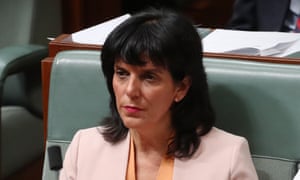Australian politics needs women like Julia Banks – but it is hostile territory
Liberal’s departure needs to be a wake-up call: voters’ despair must turn to hope before the system itself becomes obsolete
“The story of my journey is that I am an ordinary person and not someone who hails from the political rich or privileged elite,” said Julia Banks in her first speech to federal parliament in September 2016.
“I am someone who has never worked within the iron fist of the trade union movement and who is not a career politician. I am a daughter of parents who were denied an education but who worked hard with optimism and faith in this country at two, and sometimes three, jobs so they could hope to provide their children with schools of their choice.”
Banks is a rational and accomplished woman, who came to politics from life outside, after a 25-year business career, with a clear set of values and objectives, motivated to make a contribution to public service.
To cut a long story short, the recruitment of people like Julia Banks is exactly what Australian politics needs, particularly the Liberal and National parties – modern political movements hampered by a reflexive stone-age sensibility when it comes to respecting the talents of women.
But what she’s discovered during her tour of duty is Australian politics is difficult for women, and as I’ve noted before, increasingly hostile territory for human beings.
Given Banks is not yet institutionalised, and is choosing to depart before being subsumed, her lived experience of political life aligns with perceptions of voters, who look at the goings-on with increasing levels of incomprehension.
Banks has discovered, at the coalface, that politics is irrational and perverse, because it has become captured by false feedback loops where the voices of a shrill few determine outcomes for the many, and where brutal power dynamics possess more gravitational force than reason, collaboration and synthesis.
Politics is fast becoming the art of people shouting in small rooms.
While Banks’ refreshingly frank account of toxic internal machinations will doubtless grab the headlines, the Victorian Liberal MP’s parting statement on Wednesday contains within it a damning indictment of the current state of play that stretches beyond the unseemly vignette of a bunch of adrenaline-soaked bully boys wedging their feet in closing doors and stealing one another’s play lunches.
Stepping through her reasoning, she’s evidently reached a conclusion that she can’t reconcile the pursuit of national interest with the grim reality of how politics is practised in the Canberra cloisters.
Just let that observation settle on you for a moment.
Give yourself a moment to take that in.
During a short stint in politics, Banks says she’s listened “to the people who elected me and put Australia’s national interest before internal political games, factional party figures, self-proclaimed power brokers and certain media personalities who bear vindictive, mean-spirited grudges intent on settling their personal scores”.
But the chaos and destruction of the last week proved to be “the last straw”.
She notes that voters in her Victorian seat of Chisholm were very clear about what they wanted. They wanted Malcolm Turnbull in the Lodge and Julie Bishop to continue as his deputy.
Those views lined up with her own diagnosis of what was right for the government she helped install in power by winning a marginal seat at the last federal election. Chisholm was the only seat captured from Labor in 2016.
Yet neither thing happened.
In proceeding to execute a leadership change that voters hadn’t actually asked for – and a large proportion of the Liberal party didn’t really want – arms got twisted.
MPs were pressured into acting against the government’s best interests as a collective – which is about as close to a definition of insanity as you’ll get.
The canary in the coalmine for the fury and despair felt by many Liberal women was Linda Reynolds, a Western Australian Liberal who was so alarmed by the behaviour she was witnessing over the course of the past week that she took herself into the sanctuary of the Senate chamber to protest.
Reynolds, who is a tough-minded political operator with a defence background, described her own state of mind as “distressed and disturbed”.
“In fact, some of the behaviour is behaviour I simply do not recognise and I think has no place in my party or this chamber,” she said, noting whatever the result of the leadership implosion, “I cannot condone and I cannot support what has happened to some of my colleagues on this side, in this chamber, in this place”.
“The tragedy of what has been happening, the madness of what has taken hold of a number of my colleagues is this has been a very good government, and a government is always more than a leader, and the leader is only ever the sum of those he or she serves with,” Reynolds said.
So let’s cut our long story short.
Australian politics needs to be something more than the committed agent of its own destruction.
It needs to provide talented people with the nourishment to be able to manage the opportunity costs of the life.
It needs to address the sick workplace culture where participants after 10 years of civil warfare now roam the precinct in a permanent state of fight or flight.
It needs to stop dressing up chaos and disaster as an exciting new chapter.
It needs to allow the participants who still come to Canberra motivated by the ideals of public service to actually serve their communities, and deploy their talents in building and enlarging, not in destruction and scheming.
It needs to listen to the voices of the voters trapped outside in a state of despair and disaffection, wondering why the only predictable quality left in the system is an obsolescence that quickens in every cycle.
It needs to wake up, and give voters something to hope for.

No comments:
Post a Comment